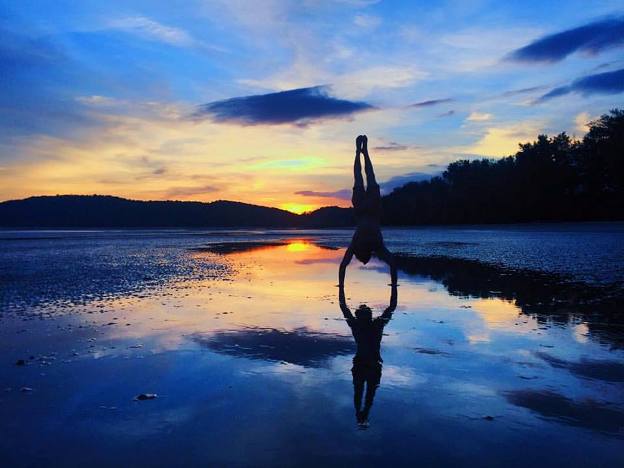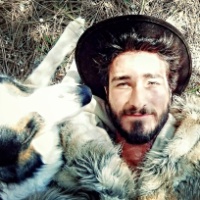
Balance is all around us, but as a whole, we forget our own balance in this infinite scale.
I’ve always been intrigued by nature. When I was young, I moved up into the Rocky Mountains of Colorado with my family, and I fell in love. I spent hours wandering the acres of our new home, fantasizing that I had my very own mountain, my very own kingdom. I was enraptured. I had never been able to step out my door and into the wild like that.
No more concrete. No more sirens. No more exhaust. Just the wind, so crisp it felt like it might shatter like glass, and the smell of Juniper that tickled my nose.
Nature is the greatest teacher we know. She works in a divine paradox, tender and cruel, give and take. It’s proven that those who work closer with nature tend to be happier, less stressed individuals.
But why is this?
Outside isn’t just a thing beyond our walls, and nature isn’t just outside. We are nature. She’s medicine to us, because she reminds us that we are connected. She takes us out of the glamor—the need for approval and validation from others. She tells us that we are and that she is, and that’s perfect.
She validates our existence, because to her, we’re all equals.
By denying nature, we deny our own nature.
With the growth of technology and the powerful tide of the industrial era, human beings have been swept further and further from connection to the planet, and from a connection to our ancestors carried forward for many generations.
We’ve created objects and tools we couldn’t have even imagined two hundred years ago, skyscrapers and planes and the internet. Our creations have given us much and are a monument to our genius.
But what are they taking? We are at an all-time high for disease and health care crises in our race. Why do we grow sicker?
We were given the potential of fire, and we have exploited that power. All the devices we have use energy—the same heat, same fire we were given long ago. We fail to realize that we aren’t separate entities; when we burn nature, we burn each other and ourselves.
The more advanced we become as a species, the more controlled we become as individuals.
Slowly, we become a lot like the machines we obsess over. We have been indoctrinated into believing that progress is defined by two points—behind you and in front of you—making our expectation of development more or less linear.
When we think of life in terms of lines, point A to point B, we are perpetually achieving something as a whole.
But are we truly attaining anything as individuals?
Lie next to a river, and you may learn a lot. These veins of the earth operate much like the veins in our own body. Carrying nutrients and life all over the landscape. We exist on this body of earth as a microorganism, just like the microorganisms that exist within us. When in balance with our micro-neighbors, we are healthy and full of life.
When out of balance, they steal the life we share with them.
In nature, we witness cycles, life played out in circular evolution. The seasons balance each other, and our world revolves around hot and cold, death and rebirth. Machines are the only thing on this planet that exist linearly.
When we switch our perception from this linear industrial model of progress to nature’s cyclical model of evolution, an interesting truth arises.
If we aren’t constantly moving forward, then the actions we take and the choices we make have a much more definable weight.
Suddenly, we are the sole procurers of our reality, and each of our actions has an ongoing effect on the communities, environments and people we cherish. Total responsibility is a heavy thought for many. The past isn’t something we can put on the back burner and turn away from, because we are the past and the present, and thus the future, and our choices are connected to all three.
The balance has been tipped by this addiction to our creations. Instead of understanding the body as a reflection of the deeply intricate and connected ecosystems around us, we treat it like our machines. We have systematized most aspects of our existence, trying to monopolize in all our endeavors. It’s how we grow our crops, treat our livestock and even live with one another.
Sacredness is lost among many.
There is one word that makes our world continue: Difference.
Without variety nothing would live. Without variety there is no unity. Humans are creators by nature, and we shouldn’t stop.
But this truth needs to be brought closer to home.
The next handful of years are going to be big ones in the history of man. The deeper these words can reach, perhaps the more respect we can gain for what exactly we choose as creators. We can have the toys and still be part of this balance—but we must remember the bigger picture.
Get outside and say thank you.
Go get lost in the woods for a bit. If you’re in a city, find a tree and actually observe it. There are insects hard at work, birds making their homes, leaves budding and rustling in the wind, and all the while it’s growing. Realize how much life is going on around you, even in the things you perceive as boring or dormant.
It might not be glamorous, but it’s the real stuff. Understanding this will pull you out of the belief that you are some separate entity having an isolated experience. You are part of this mandala, this moving network of life and color.
Zoom out far enough, and it looks like there is nothing happening in your neighborhood. But take a closer look and see the cars and people scurrying about, working and making home. A tree and your neighborhood have more in common than you might imagine.
These parallels are all around; this is the balance.
Yes, technology is vital to out survival, but as soon as it separates us from the whole of creation, we become separated from ourselves, and are already dead to this life.
~
Author: Rainer Jundt
Editor: Toby Israel
Photo: Author’s Own
~






Read 0 comments and reply